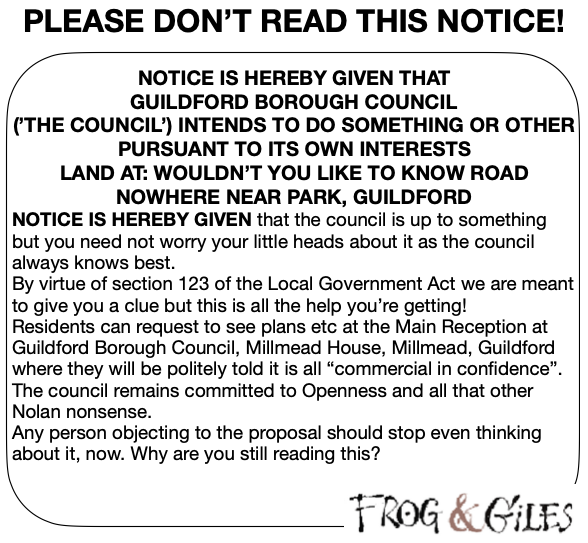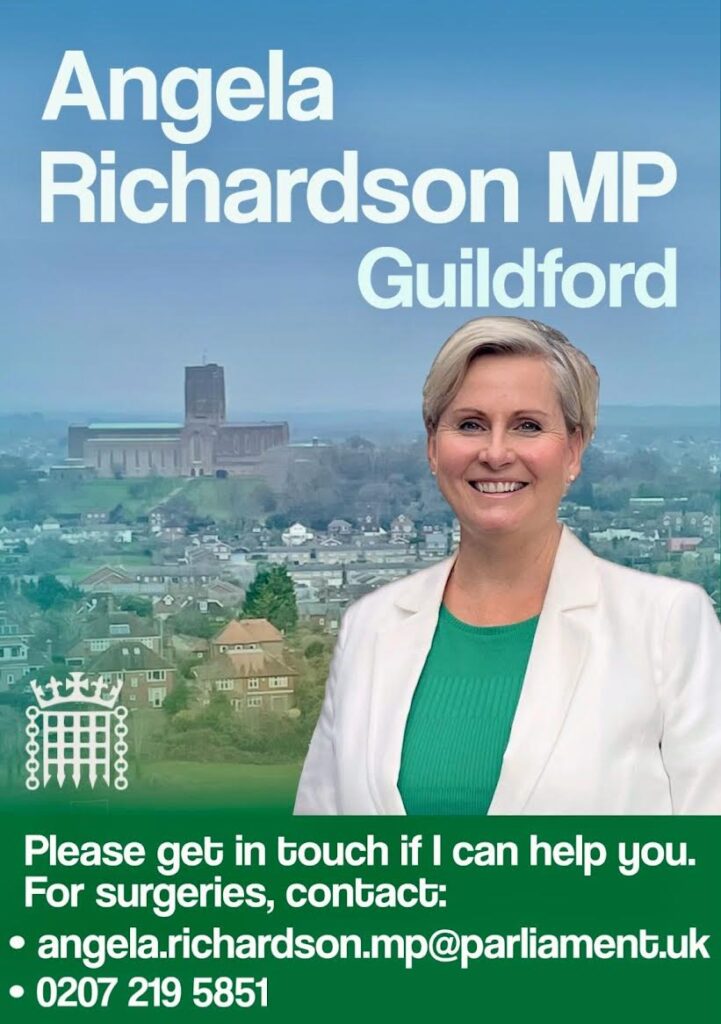 Abraham Lincoln
If given the truth, the people can be depended upon to meet any national crisis...
Abraham Lincoln
If given the truth, the people can be depended upon to meet any national crisis...
 Guildford news...
for Guildford people, brought to you by Guildford reporters - Guildford's own news service
Guildford news...
for Guildford people, brought to you by Guildford reporters - Guildford's own news service
Dragon Interview: Police Commissioner David Munro
Published on: 10 Jan, 2021
Updated on: 13 Jan, 2021
Should “first responders” have a higher priority for vaccination and are Surrey Police striking the correct balance in enforcing compliance with the present restrictions?
And how should the pandemic be policed? One case in Derbyshire, where two women were issued £200 penalty notices for travelling five miles to meet for a nature walk, has made headlines. Police told them the hot drinks they had constituted a picnic. The case is among others now being reviewed.
Surrey Police have had no known similar instances but with rapidly increasing levels of infection and reports of lower levels of compliance, are they doing enough?
Dragon editor Martin Giles puts these questions to our Police and Crime Commissioner, David Munro.
The interview was conducted in the evening before the Health Secretary said that yet tougher rules might be needed or the Home Secretary backed stricter police enforcement of Covid regulations.
Why do you think first responders should get priority for vaccinations? They are younger and fitter generally, so aren’t they at less risk?
I do appreciate the strength of that argument and I’m not saying they should go right to the front of the queue of 80-year-olds, nursing staff and so on but first responders, the police, fire and rescue and the ambulance service, they get to some quite nasty situations where they put themselves in harm’s way, and I regret to say it is not uncommon for our police officers to be spat at deliberately. That has actually happened.
Many officers are unfortunately having to self-isolate because they have come into contact, in the course of their duty, with those who have, or could have, Covid. We are coping but if the problem gets much worse, then we will have too many abstractions of officers scheduled for duty.
So I think a proportionate response is to get the police officers, and other first responders, higher up in the queue. Exactly where in the queue, nationally, would be up to the Ministry of Health.
I do know the Home Office is pressing for first responders to be prioritised. It is like the advice on plans about donning oxygen masks. Don yours first, before you help others. We want a fully fit police force and fully fit ambulance service.
I take the point that there are lots of other groups who want to get vaccinated. Others ask: “Where should social workers or teachers be?” Part of my role is to lobby on behalf of the police, so I thought it right I went public to say I supported the national effort to do that.
So your argument is that vaccination, as well as protecting first responders for their own sakes, could cut down the number of days police are unavailable for duty and reduce the impact that has on their operations, which affects us all?
Absolutely. And police work as a team so if one member is absent that can have a disproportionate impact.
But isn’t the rationale behind the current prioritisation, that older people who become infected are more likely to be hospitalised, creating more pressure on our already overstretched NHS?
I absolutely accept that. It is not a clear-cut black and white issue and that is why I am not, nor is anyone else, suggesting first responders elbow all others out of their place in the queue. But we want them to be higher than they are.
I don’t know where we are at the moment frankly, I don’t think anybody knows. All PCCs, including me, are asking for the case for police and first responders to be treated differently to be seriously considered.
You told me you have read our opinion piece (This Lethal Virus is No Respecter of Softly, Softly Policing) which asks whether Surrey Police policy on enforcing pandemic rules is firm enough. What is your view on that?
I believe the police have got it right. In Surrey, we have been at it for a year now, unfortunately, and the results show that up until very recently people are obeying the rules.
In fact, they are still obeying the rules and our policy of the four Es [Engage, Explain, Encourage, Enforce] has been proved to work. Not everybody obeys the rules but the vast majority of people do.
I have no evidence people are disobeying them so much that the transmission rate has been affected. It is simply that the new variant is more transmissible, more infectious. So there is nothing to alter my opinion that the balance is roughly right.
I don’t speak for the chief constable but I do know he thinks that as well. Of course, the chief constable is in charge of operations; it is he who makes the decision. I can question that and hold him to account, as I have done, but he’s the one who calls the shots.
The police have put considerable resources into patrolling the pandemic. We got a £400k grant from the government to pay for overtime and a lot of police officers have been working much longer hours than they normally would.
During weekdays, they are out and about in town centres, including supermarket car parks. I have had reports that police have cruised around them and beauty spots where people understandably congregate.
Before the full lockdown, they were out more in the town centres when there was a bit more of the night-time economy running, of course that’s gone now. So they have been pro-active.
We are in a different position now because the transmission rates are going way up but I still agree with the chief constable, and we have talked about this, that the way to ensure compliance is to do it by persuasion, education and explanation, and we know it works.
But there are anecdotal reports from supermarkets, the one place most of us can’t avoid because we have to buy our food, we can’t all have it delivered, there is still some breaking of the rules, people not observing social distancing and some not even wearing masks. Wouldn’t it help if police officers occasionally showed their presence?
I don’t have any stats on mask compliance in supermarkets. My anecdotal experience in Farnham is that compliance is pretty well 100%. It wasn’t to start with but it is now. So that is one anecdote against another.
The police are reluctant, and I support them in this, to patrol the aisles of supermarkets for two reasons: first it is not our job, it’s the job of the supermarkets. They have got security staff to do that and we don’t want to be sucked into something they are perfectly capable of doing.
It doesn’t require a police officer, it requires someone in authority to tell people. Obviously, if there is any trouble then we will attend as normal. And the second reason is that when, nine months ago, some other police forces were a little unsure about how to apply the rules we got all these horror stories of overzealous policing and it actually rather alarmed people.
But they were not telling people to put masks on, they were making judgements about what was deemed essential and non-essential items permissible to purchase. That’s where the friction came.
I think we are going to have to differ on that because what I can say is, and I do accept the point generally, when I was at the local outbreak engagement board I did raise this specific point, asking if supermarkets were a real hot-spot for infection and the answer was yes, they are. So they are on the list of hot-spots drawn up by Surrey County Council, places where people congregate, supermarkets are on that list.
I have asked the police to get in touch with the county council to see if there is any way the police can accompany those vans; not all the time, they have other things to do, but to show a police presence. That is going a little way to recognise that problem.
And my second suggestion in the opinion piece was for there to be some checkpoints on roads because traffic has not diminished to the same extent it did during the first lockdown and it is hard to imagine all vehicle journeys are essential as defined under the rules.
I am sure some journeys are not. That’s life but my anecdotal experience is that most are. I had to do a work journey at rush-hour yesterday morning and there was a lot of traffic but it was all white vans. In the first lockdown industry closed down. That has changed now.
I am not in favour of roadblocks. And neither is the chief constable. We think this tips the balance between enforcing the law and infringing on people’s liberties too far. So it is a point of principle for me, roadblocks are wrong in a country that values its freedom.
The police will of course stop vehicles for a reason and they have powers to do that and will continue to do so. And one of the standard questions will be: “Why are you out at all?”
It’s a balance between the civil liberties of the vast majority who are obeying the rules and in my view that would be a little bit overzealous. There is a practical problem. Stopping people takes an enormous amount of resource.
I want to stop burglars from going about their trade, I don’t want to stop people who will nearly always turn out to be completely innocent.
The official gov.uk guidance on enforcement of mask-wearing is:
Enforcement measures for failing to comply with this law
Premises where face coverings are required [this includes supermarkets] should take reasonable steps to promote compliance with the law.
The police can take measures if members of the public do not comply with this law without a valid exemption…
If necessary the police officers have enforcement powers, including issuing fines of £200 (reduced to £100 if paid within 14 days) for the first offence.
Repeat offenders receiving fines on public transport or in an indoor setting will have their fines doubled at each offence.
After the first offence there will be no discount. For example, receiving a second fine will amount to £400 and a third fine will be £800, up to a maximum value of £6,400.
And for stopping vehicles:
Powers of entry and to stop vehicles (taken from College of Policing guidance)
The Coronavirus Act 2020 has created certain offences that may be discovered upon officers stopping any vehicle.
Example: a constable can stop a vehicle to ascertain the reasons for being out and if they don’t fall into any of the ‘reasonable excuse’ categories then they can be cited for committing an offence under the coronavirus legislation.
Responses to Dragon Interview: Police Commissioner David Munro
Leave a Comment Cancel replyPlease see our comments policy. All comments are moderated and may take time to appear.

See Dragon story: GBC’s Explanation of Major Land Sale Notice Error ‘Borders on Arrogant’ Says Councillor






Recent Articles
- Zero Re-opens Uptown
- Letter: I Hope the New CEO Will Reflect on the Constructive Advice
- Campaign to Encourage Visitors to the Surrey Hills To Go by Train
- Police Commissioner Office Ordered to Remove Social Media Messages
- Police and Crime Commissioner Candidate Interview – Kate Chinn
- Guide to Telephone Befriending Services for Older People
- Stage Dragon: Sleuth at the Yvonne Arnaud Theatre
- Guildford Lido All Set for the 2024 Season
- Appointment of Permanent Joint Strategic Director of Finance Confirmed
- Police and Crime Commissioner Candidate Interview – Alex Coley


Recent Comments
- Graham Vickery on M25 Junction 10 Project Required Major Engineering to Overcome Pipeline Snag
- H Trevor Jones on Police and Crime Commissioner Candidate Interview – Paul Kennedy
- Jack Bayliss on Invitation to Join Mass Bike Ride on Saturday, April 27
- Ben Paton on M25 Junction 10 Project Required Major Engineering to Overcome Pipeline Snag
- Bibhas Neogi on M25 Junction 10 Project Required Major Engineering to Overcome Pipeline Snag
- Roland Dunster on Birdwatcher’s Diary No.302
Search in Site
Media Gallery
Dragon Interview: Local Artist Leaves Her Mark At One of England’s Most Historic Buildings
January 21, 2023 / No Comment / Read MoreDragon Interview: Lib Dem Planning Chair: ‘Current Policy Doesn’t Work for Local People’
January 19, 2023 / No Comment / Read MoreA3 Tunnel in Guildford ‘Necessary’ for New Homes, Says Guildford’s MP
January 10, 2023 / No Comment / Read More‘Madness’ for London Road Scheme to Go Ahead Against ‘Huge Opposition’, Says SCC Leader
January 6, 2023 / No Comment / Read MoreCouncillor’s Son Starts Campaign for More Consultation on North Street Plan
December 30, 2022 / No Comment / Read MoreCounty Council Climbs Down Over London Road Works – Further ‘Engagement’ Period Announced
December 14, 2022 / No Comment / Read MoreDragon Interview: GBC Reaction to the Government’s Expected Decision to Relax Housing Targets
December 7, 2022 / No Comment / Read MoreHow Can Our Town Centre Businesses Recover? Watch the Shop Front Debate
May 18, 2020 / No Comment / Read More







Name and address supplied
January 10, 2021 at 10:56 pm
I’d be interested to hear from Mr Munro why he believes Surrey Police are unwilling to enforce Tier 4 restrictions in town centre facilities. This weekend, there were numerous people from multiple households socialising and mixing at Stoke Park skate park and outdoor gym facilities, both clearly marked with ‘Closed’ signs.
The duty ranger at one point counted 43 people in the skate park but he has no power to disperse them or enforce the current lockdown law and they simply ignored him. When reported to 101, the police replied that it was not their concern.
If not theirs, whose is it?